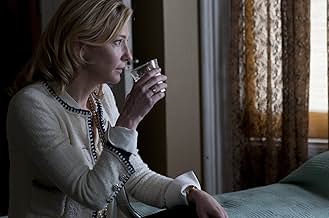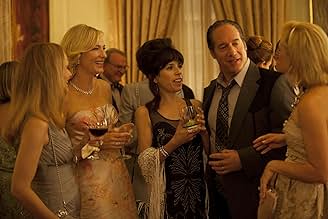Uma jovem de Nova Iorque, profundamente perturbada e em negação, chega a San Francisco para impor-se a sua irmã.Uma jovem de Nova Iorque, profundamente perturbada e em negação, chega a San Francisco para impor-se a sua irmã.Uma jovem de Nova Iorque, profundamente perturbada e em negação, chega a San Francisco para impor-se a sua irmã.
- Ganhou 1 Oscar
- 56 vitórias e 83 indicações no total
Avaliações em destaque
Sometimes it feels like Woody Allen is deliberately hit and miss. Every other film appears to be a winner so it's become easy to just skip the mediocre ones. I thought Midnight In Paris was pretty good but I felt like its idea wasn't explored well enough and it became too repetitive. Blue Jasmine is a film that feels like it'll be another basic story at first then as the tragedy slowly unravels, it becomes all the more fascinating. At first the film's structure of flashbacking without transition is a little frustrating as the present time doesn't give you much to chew on in the first place, but it soon becomes clear that this was the only way to tell this brilliant and complex story of a woman's place in the world. Cate Blanchett is setting the reviews on fire and she certainly deserves it. I've always loved her engrossing theatrical style in films like The Aviator and The Curious Case of Benjamin Button and I've missed her since.
Here she is in full force as she switches from glamour to glare seamlessly and effortlessly. Blanchett has often played strong women and she tiptoes the line of Jasmine's strength and vulnerability both with and without sympathy. It's incredible to watch. Although I was concerned I was going to only appreciate the performance and not connect with the character, I ended up finding her struggle to feel useful in the working world and not knowing how to achieve her ambitions to cut deep into the first world human anxieties about identity and self- worth. It's great to have a film that addresses those issues so earnestly, without feeling self- pitying. Although the spotlight is on her, there's plenty of room for the supporting players to shine with the delightful comic relief performances from Louis C.K., Michael Stuhlberg and Max Casella and deceptively charming performances from Alec Baldwin, Andrew Dice Clay and Peter Sarsgaard. The real talent on the side belongs to Sally Hawkins and Bobby Cannavale who give compelling and heartbreaking performances.
I like how Allen has such confidence in his shooting style of simple wides and closeups that he doesn't let it get in the way of the story but sometimes it does feel bland rather than just Woody's brand. It sometimes feels like the story is taking uninteresting broad strokes with its archetypes but when the details come in like a mystery novel, they enrichen the story and leave just before they drown you making you want more. Perhaps Allen could've made a better job of making me intrigued in the details but that makes the pay-offs all the more sweeter. However, I'm not quite sure what to make of the ending, perhaps Allen is trying to say there's some people who can and can't be fixed, I'm not sure, but it's a fascinating tragic comic tale nonetheless. Maybe it's intended as a punishment film regarding the sin of greed. That would make sense though it wouldn't be as satisfying. It's been compared to A Streetcar Named Desire a lot but I don't remember much of that story despite having seen it twice. I think I prefer Blue Jasmine. One of Allen's most unsuspecting heavyweight films in a long time.
8/10
Here she is in full force as she switches from glamour to glare seamlessly and effortlessly. Blanchett has often played strong women and she tiptoes the line of Jasmine's strength and vulnerability both with and without sympathy. It's incredible to watch. Although I was concerned I was going to only appreciate the performance and not connect with the character, I ended up finding her struggle to feel useful in the working world and not knowing how to achieve her ambitions to cut deep into the first world human anxieties about identity and self- worth. It's great to have a film that addresses those issues so earnestly, without feeling self- pitying. Although the spotlight is on her, there's plenty of room for the supporting players to shine with the delightful comic relief performances from Louis C.K., Michael Stuhlberg and Max Casella and deceptively charming performances from Alec Baldwin, Andrew Dice Clay and Peter Sarsgaard. The real talent on the side belongs to Sally Hawkins and Bobby Cannavale who give compelling and heartbreaking performances.
I like how Allen has such confidence in his shooting style of simple wides and closeups that he doesn't let it get in the way of the story but sometimes it does feel bland rather than just Woody's brand. It sometimes feels like the story is taking uninteresting broad strokes with its archetypes but when the details come in like a mystery novel, they enrichen the story and leave just before they drown you making you want more. Perhaps Allen could've made a better job of making me intrigued in the details but that makes the pay-offs all the more sweeter. However, I'm not quite sure what to make of the ending, perhaps Allen is trying to say there's some people who can and can't be fixed, I'm not sure, but it's a fascinating tragic comic tale nonetheless. Maybe it's intended as a punishment film regarding the sin of greed. That would make sense though it wouldn't be as satisfying. It's been compared to A Streetcar Named Desire a lot but I don't remember much of that story despite having seen it twice. I think I prefer Blue Jasmine. One of Allen's most unsuspecting heavyweight films in a long time.
8/10
Woody Allen's finely tuned screen-writing skills and his talent for eliciting standout and often award-winning performances from his leading ladies are on full display in "Blue Jasmine." Alec Baldwin, the slick husband of a middle-aged socialite, Cate Blanchett, pulls a Bernie-Madoff swindle and ends up in jail. The homes, the cars, the furs, the jewels, the furniture all go to the Feds, and the penniless Cate flies first class to San Francisco with her Louis Vuitton luggage to stay with her non-biological sister, Sally Hawkins, until she gets back on her feet. Blanchett, the Jasmine of the title, is totally unprepared for her economic fall. She decides to become an interior designer, but wants to study on-line; however, she is computer illiterate and must take a course, before she can begin to study decorating; but, she needs money for the courses and takes a receptionist job with a lecherous dentist. Although the film addresses serious issues, the Allen humor will provoke smiles and an occasional chuckle, from small well-observed moments such as the attempts of indecisive patients to make dental appointments.
Understandably, Cate Blanchett's Jasmine teeters on the edge of a nervous breakdown; she lies instinctively, even to herself; and she cannot or will not face the reality of her downward mobility. The role is an actress's showcase, and Blanchett is in top form; her nervous rambling monologues, either to herself or to unwilling strangers, provide a study guide for aspiring actors. Jasmine brays at her "sister," Ginger, effortlessly and engagingly played by Hawkins; she nags about Ginger's job, lover, and living quarters, until Ginger points out Jasmine's own diminished situation. Jasmine bellows that Ginger can do better than her amorous boyfriend, Chili, a charismatic Bobby Cannavale with a bad haircut and faded tattoo; eventually, Ginger reminds her that her own choice of husband was less than stellar. Jasmine, Ginger, and Chili make an aromatic trio, whose names perhaps allude to their personalities, and they are ably supported by Louis C.K., a horny guy with the hots for Ginger, and Peter Sarsgaard, a respectable diplomat seeking a suitable wife for his political career.
In keeping with the film's title, Woody uses blues on the soundtrack, and his cinematographer, Javier Aguirresrobe, lenses the dual New York and San Francisco locales effectively. Although the jump cuts in time are jarring initially, viewers will quickly accommodate to New York being the past and San Francisco the present. Woody at age 78 is a master writer, especially of women's characters, and "Blue Jasmine" finds him at his best. Although Woody's trademark humor flickers throughout, the film is essentially about a vulnerable woman standing amidst the ruins of her former life and facing a precariously uncertain future. Audiences may come out praising the performers, but humming the blues.
Understandably, Cate Blanchett's Jasmine teeters on the edge of a nervous breakdown; she lies instinctively, even to herself; and she cannot or will not face the reality of her downward mobility. The role is an actress's showcase, and Blanchett is in top form; her nervous rambling monologues, either to herself or to unwilling strangers, provide a study guide for aspiring actors. Jasmine brays at her "sister," Ginger, effortlessly and engagingly played by Hawkins; she nags about Ginger's job, lover, and living quarters, until Ginger points out Jasmine's own diminished situation. Jasmine bellows that Ginger can do better than her amorous boyfriend, Chili, a charismatic Bobby Cannavale with a bad haircut and faded tattoo; eventually, Ginger reminds her that her own choice of husband was less than stellar. Jasmine, Ginger, and Chili make an aromatic trio, whose names perhaps allude to their personalities, and they are ably supported by Louis C.K., a horny guy with the hots for Ginger, and Peter Sarsgaard, a respectable diplomat seeking a suitable wife for his political career.
In keeping with the film's title, Woody uses blues on the soundtrack, and his cinematographer, Javier Aguirresrobe, lenses the dual New York and San Francisco locales effectively. Although the jump cuts in time are jarring initially, viewers will quickly accommodate to New York being the past and San Francisco the present. Woody at age 78 is a master writer, especially of women's characters, and "Blue Jasmine" finds him at his best. Although Woody's trademark humor flickers throughout, the film is essentially about a vulnerable woman standing amidst the ruins of her former life and facing a precariously uncertain future. Audiences may come out praising the performers, but humming the blues.
"Blue Jasmine" is a Drama movie in which we follow Jasmine, a once-wealthy New York socialite who struggles to cope with a dramatic fall from grace after her husband's financial scandal.
I found this movie interesting and emotionally intense, since it explore themes like loss, delusion, and personal unraveling. The interpretation of Cate Blanchett who played as Jasmine was extraordinary and the undeniable highlight of the movie. She delivered a captivating portrayal of a woman slowly descending into madness, while the contrast between her past extravagant life and her current crumbling reality created a compelling narrative. I believe that Cate Blanchett made one of her best performance if not her best, something that engaged the audience. The direction which was made by Woody Allen was very good and he brought out strong interpretations from the entire cast. All in all, I have to say that "Blue Jasmine" is an amazing movie and I strongly recommend everyone to watch it.
I found this movie interesting and emotionally intense, since it explore themes like loss, delusion, and personal unraveling. The interpretation of Cate Blanchett who played as Jasmine was extraordinary and the undeniable highlight of the movie. She delivered a captivating portrayal of a woman slowly descending into madness, while the contrast between her past extravagant life and her current crumbling reality created a compelling narrative. I believe that Cate Blanchett made one of her best performance if not her best, something that engaged the audience. The direction which was made by Woody Allen was very good and he brought out strong interpretations from the entire cast. All in all, I have to say that "Blue Jasmine" is an amazing movie and I strongly recommend everyone to watch it.
What a treat! Cate Blanchett gives a stunning performance as a Blanche-like character written and directed by the most prolific American author of the last 40 years. Cate seems to be an actress without emotional borders. Jasmine walks a very tight rope, her sense of despair etched in her magnificent face vanishes ipso facto when she meets Peter Sarsgaard. She realizes in a sort of disbelief -extraordinary, heartbreaking and horribly funny moment - that he could be the rescue raft in her own personal tsunami. Sally Hawkins, another stroke of genius in the casting department, is a profoundly human creature very much the Stella of the situation. This two sisters, adopted both from different parents are also from different, if immediately recognizable, universes. I could go on and on but I'm not going to, I just wanted to urge you, in this times of 3D super extra loud marvel sequels, to run and see it.
It's a great and unexpected surprise when Woody can beat both the Coens and the French these days in a film about delusion and self. I'm not a fan of his overall trajectory and predilections, but I won't deny any film its effectiveness.
Woody here pierces through to the essential thing. It's a film about modern suffering but that is clearly seen here as attachment to internal narrative, not just a general thickness around being. He maintains inextricability; it is both her fault and a life of circumstance with no clean separation. The woman still carries echoes of that previous narrative around her, soon it becomes clear that the explanatory flashbacks are hallucinated after the fact.
Overall Woody here arrives at a tender admission. It would be all too easy to discard or condemn her as pampered and sheltered, this is only part of the thrust here. He doesn't romanticize privilege the way Sofia Coppola is prone to, another plus: we're called to sympathize with more than a victim. The admission is that life in its course of being lived leaves indelible marks in the story of who you are, that this is only real to the extend that you inhabit the story, and yet that's it's genuinely hard to distinguish one self from the other.
He doesn't give this internal world to us with particular visual richness, few filmmakers his age do. There is 'color and shape', tied to the narrator's vivid imagination who aspires to be an 'interior designer', but Woody could have done so much more with the logic of memory. No, the real effect here is geared in the combination of asking the multilayered Blanchett to inhabit a character who inhabits and continuously recalls a story. She's marvelous. She seems to know the degree to which Jasmine blurs the recalled story to be only about color and appearances is the same one to which she blurs the current one, true love from convenience, responsibility from mere absent-mindedness, all these Blanchett truly, genuinely blurs around the character she inhabits.
It's deceptively easy to consume this thinking Jasmine knew in advance or was never in love, be aware and sensitive to this difference. It blooms once you reflect back on it, inhabit her world instead of pass through with moral superiority, because doing this means that your own tools of defining truth must be called into judgement.
It's a fine film, much better than the hollow inhabiting of his Midnight. This one cuts. A Woman Under the Influence appears to have been a template, Jasmine's muttering to herself on the street is a reference. Like that film, it is as much the filmmaker's as the actresses' creation, impossible without the richness Blanchett fleshes with.
Woody here pierces through to the essential thing. It's a film about modern suffering but that is clearly seen here as attachment to internal narrative, not just a general thickness around being. He maintains inextricability; it is both her fault and a life of circumstance with no clean separation. The woman still carries echoes of that previous narrative around her, soon it becomes clear that the explanatory flashbacks are hallucinated after the fact.
Overall Woody here arrives at a tender admission. It would be all too easy to discard or condemn her as pampered and sheltered, this is only part of the thrust here. He doesn't romanticize privilege the way Sofia Coppola is prone to, another plus: we're called to sympathize with more than a victim. The admission is that life in its course of being lived leaves indelible marks in the story of who you are, that this is only real to the extend that you inhabit the story, and yet that's it's genuinely hard to distinguish one self from the other.
He doesn't give this internal world to us with particular visual richness, few filmmakers his age do. There is 'color and shape', tied to the narrator's vivid imagination who aspires to be an 'interior designer', but Woody could have done so much more with the logic of memory. No, the real effect here is geared in the combination of asking the multilayered Blanchett to inhabit a character who inhabits and continuously recalls a story. She's marvelous. She seems to know the degree to which Jasmine blurs the recalled story to be only about color and appearances is the same one to which she blurs the current one, true love from convenience, responsibility from mere absent-mindedness, all these Blanchett truly, genuinely blurs around the character she inhabits.
It's deceptively easy to consume this thinking Jasmine knew in advance or was never in love, be aware and sensitive to this difference. It blooms once you reflect back on it, inhabit her world instead of pass through with moral superiority, because doing this means that your own tools of defining truth must be called into judgement.
It's a fine film, much better than the hollow inhabiting of his Midnight. This one cuts. A Woman Under the Influence appears to have been a template, Jasmine's muttering to herself on the street is a reference. Like that film, it is as much the filmmaker's as the actresses' creation, impossible without the richness Blanchett fleshes with.
Você sabia?
- CuriosidadesBecause Woody Allen doesn't get into motivation or background of a character when he's directing actors, Cate Blanchett and Sally Hawkins got together and invented the background for the sisters' relationship. So every scene when they talked about their past, although it's vague on the script and for the viewer, they both knew exactly what the sisters are talking about.
- Erros de gravaçãoWhen Ginger, Jasmine, Chili and Eddie are at the clams restaurant, Eddie asks Jasmine what would she be if she had finished her education. She answers, "An anthropologist". Eddie ignorantly asks, "Really, digging up fossils?" Jasmine replies mockingly: "That's an archaeologist". She is wrong. The correct answer would be, "That's a paleontologist". Jasmine is belittling Eddie for his ignorance, but she is in fact displaying ignorance herself.
- ConexõesFeatured in The Tonight Show with Jay Leno: Episode #21.188 (2013)
- Trilhas sonorasBack O'Town Blues
Composed by Louis Armstrong & Luis Russell
Performed by Louis Armstrong and the All-Stars
Courtesy of The Verve Music Group
Under license from Universal Music Enterprises
Principais escolhas
Faça login para avaliar e ver a lista de recomendações personalizadas
- How long is Blue Jasmine?Fornecido pela Alexa
Detalhes
- Data de lançamento
- País de origem
- Centrais de atendimento oficiais
- Idioma
- Também conhecido como
- Jazmín Azul
- Locações de filme
- Ocean Beach, San Francisco, Califórnia, EUA(Ginger and Al walking along the beach)
- Empresas de produção
- Consulte mais créditos da empresa na IMDbPro
Bilheteria
- Orçamento
- US$ 18.000.000 (estimativa)
- Faturamento bruto nos EUA e Canadá
- US$ 33.405.481
- Fim de semana de estreia nos EUA e Canadá
- US$ 612.064
- 28 de jul. de 2013
- Faturamento bruto mundial
- US$ 99.104.804
- Tempo de duração1 hora 38 minutos
- Cor
- Mixagem de som
- Proporção
- 2.35 : 1
Contribua para esta página
Sugerir uma alteração ou adicionar conteúdo ausente

































